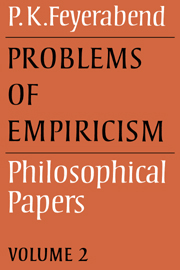Book contents
- Frontmatter
- Contents
- Introduction to volumes 1 and 2
- 1 Historical background
- 2 Classical empiricism
- 3 The structure of science
- 4 Two models of epistemic change
- 5 Philosophy of science versus scientific practice
- 6 Mach, Einstein and the Popperians
- 7 Wittgenstein's Philosophical Investigations
- 8 Consolations for the specialist
- 9 Popper's Objective Knowledge
- 10 The methodology of scientific research programmes
- 11 More clothes from the emperor's bargain basement
- Sources
- Name Index
- Subject Index
9 - Popper's Objective Knowledge
Published online by Cambridge University Press: 05 June 2012
- Frontmatter
- Contents
- Introduction to volumes 1 and 2
- 1 Historical background
- 2 Classical empiricism
- 3 The structure of science
- 4 Two models of epistemic change
- 5 Philosophy of science versus scientific practice
- 6 Mach, Einstein and the Popperians
- 7 Wittgenstein's Philosophical Investigations
- 8 Consolations for the specialist
- 9 Popper's Objective Knowledge
- 10 The methodology of scientific research programmes
- 11 More clothes from the emperor's bargain basement
- Sources
- Name Index
- Subject Index
Summary
CONTENT OF THE BOOK; MAIN THESES
The book is a collection of articles, some new, some reprinted from earlier works. It contains proposals for three areas of research: ontology, methodology, evolution. In ontology Popper proposes a pluralistic approach; in methodology he proposes critical discussion of competing views as a means of improving knowledge; in evolution he proposes a theory that entails a ‘Darwinian’ (261) epistemology and explains knowledge as an everchanging ‘exosomatic’ (251) product of the organism, as a kind of secretion that is constantly modified and augmented by trial and error procedures and that protects the organism from being modified itself. According to this theory knowledge is neither a special form of belief – for example, it is not a well-established belief, or a highly probable belief; it is not even a falsifiable and highly corroborated belief – nor does it consist in eternal ideas which we grasp but cannot change. Knowledge is a product of man, it can be changed by man, but is still objective and even autonomous, i.e. it cannot be reduced to either physical or mental processes. It is objective because it obeys laws of its own that are independent of the intentions of its creators: having been produced by man it no longer obeys all his wishes. And it is autonomous because these laws are neither physical laws, nor mental laws, nor reducible to physical and/or mental laws.
Information
- Type
- Chapter
- Information
- Problems of EmpiricismPhilosophical Papers, pp. 168 - 201Publisher: Cambridge University PressPrint publication year: 1981
Accessibility standard: Unknown
- 1
- Cited by
